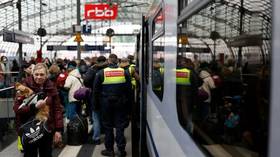German refugee numbers reach record high

The number of refugees living in Germany reached a new high this year, the newspaper Neue Osnabrucker Zeitung reported on Friday, citing government figures.
Some 3.48 million refugees, asylum seekers, and protected persons were living in Germany at the end of June 2024, according to a response from the federal government to a request by the Left party in the Bundestag. The figure is roughly 60,000 more than at the end of 2023 and more than at any time since the 1950s.
Roughly one-third of these refugees, some 1.18 million, arrived from Ukraine. Their number has increased by around 45,000 compared to the end of 2023, the data shows. The second-largest group is Syrians.
Meanwhile, the number of those set for deportation continued to decline, with some 266,000 recorded as of June 2024, a figure nearly 16,000 below what was recorded at the end of 2023. The decline is reportedly attributable to ramped-up deportation efforts. Still, it is effectively impossible to follow through on some 80% of pending deportations due to the situations in the countries of origin of those set to be expelled, according to the newspaper.
The number of asylum seekers has recently become a contentious point of political debate in Germany and Europe in general.
Last week, Chancellor Olaf Scholz’s government announced that Germany would bolster border controls for at least six months. Berlin has begun random checks at its borders with France, the Netherlands, Belgium, Luxembourg, and Denmark, thus expanding the system already in place at its other borders to the entirety of the country’s frontier.
The country has no other choice, as state and federal resources have been “almost exhausted” on refugees and asylum seekers, German Interior Minister Nancy Faeser told Brussels in a letter, Der Spiegel reported.
Germany has become one of the prime destinations for Ukrainian refugees since the beginning of the conflict between Moscow and Kiev back in February 2022. The country currently accommodates the most Ukrainian refugees among EU nations, followed by Poland with around 970,000 and the Czech Republic with some 370,000, according to the latest figures from the UN high commissioner for refugees.













